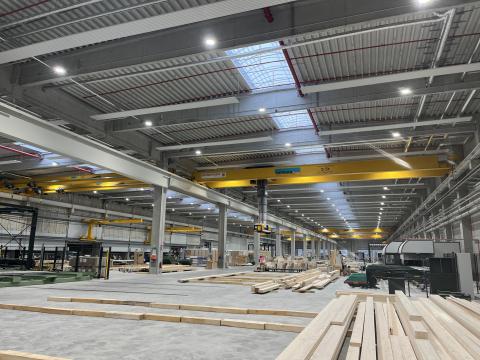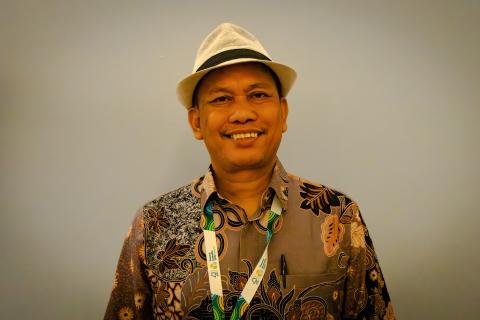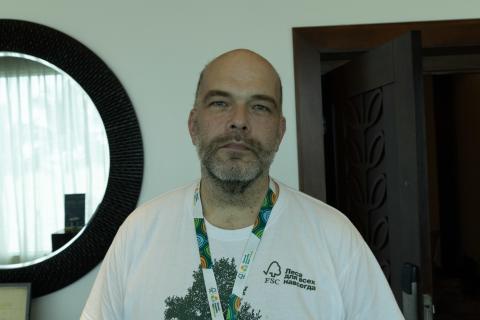Underwater forests – FSC's next frontier?
Close to 300 million trees are currently standing underwater, yet this vast resource remains largely untouched and ignored by the global timber market. Canadian-based Triton Logging has pioneered the field of underwater logging over the past 10 years, creating the technology necessary to bring this untapped resource to the market.
Close to 300 million trees are currently standing underwater, yet this vast resource remains largely untouched and ignored by the global timber market. With over 60,000 large hydroelectric projects around the world and nearly 75 new projects coming online every year, the potential of this resource continues to grow with very little interest from the certification community.
Triton Logging is ready to take a foothold
 Triton Logging based in British Columbia, Canada, has been pioneering the field of underwater logging for the past 10 years, creating the technology necessary to bring this untapped resource to the market while promoting underwater logging as an economic, environmental and socially feasible activity.
Triton Logging based in British Columbia, Canada, has been pioneering the field of underwater logging for the past 10 years, creating the technology necessary to bring this untapped resource to the market while promoting underwater logging as an economic, environmental and socially feasible activity.
Since 2005, Triton has been certified through SmartWood’s Rediscovered Wood Program, which is currently the only program that certifies submerged forest assets.
As Jim Hayhurst Vice President, Global Business explains, “Rainforest Alliance has made the effort to understand that underwater forests are significant resources and that they are a big part of the forest resource fibre basket that need to be accounted for, certified, and managed appropriately. Working with the Rainforest Alliance has been great for us, we’ve learned as much from them as they’ve learned from us about underwater logging, the appropriate way to do it, and the various standards that need to be put in place”.
Triton currently holds one of the largest, single contiguous forest concessions in the world which is entirely located underwater in Lake Volta, Ghana, the largest man-made lake in the world. The total area of the flooded forests in Lake Volta is approximately 850,000 hectares, with Triton’s concession amounting to 350,000 hectares, or 40% of the lake. By Triton’s estimates, Lake Volta will provide more than thirty years of annual harvest, and create several hundred jobs in the local economy in the first ten years.
Salvaging a lost resource
 With ever decreasing forest resources, underwater forests can provide a source of valuable trees species that have been lost due to major hydro dam projects. Though Triton doesn’t promote the flooding of forests to create this resource, they see the value in salvaging what has been lost in the flooding.
With ever decreasing forest resources, underwater forests can provide a source of valuable trees species that have been lost due to major hydro dam projects. Though Triton doesn’t promote the flooding of forests to create this resource, they see the value in salvaging what has been lost in the flooding.
Mr. Hayhurst points out, “These reservoirs have flooded vast areas that use to be occupied by people, animals and obviously forests. The reservoirs in themselves are a major intrusion and have affected people in a variety of ways: they have lost their land and lost their livelihoods. While we can’t bring that land back or those trees back in their original state, we can provide a couple of benefits”.
Social and economic benefits
The benefits to communities are many, including valuable new jobs for local communities, many of which were involved in the forestry sector prior to flooding. For example, in Ghana Triton has built a small mill that will act as a primary facility to assess the timber profile in the first years of the project. Mr. Hayhurst says, “Often there is a mill already in the area, and one of the criteria that we mark all opportunities by, is whether there is an existing forestry industry nearby.
And often there is. Triton is not in the business of building major mills, but what we do by working in a specific area is facilitate the investment made by other parties, governments, in infrastructure projects to create a forestry sector near the lake.
Safety is another positive impact of removing these trees from these underwater lakes, which are the highways of these countries. In Ghana alone there have been hundreds of fatalities over the past ten years directly attributable to trees sticking out of the water, so while removing the trees can certainly benefit the communities economically, often safety is their greatest concern.
Telling the story of salvaged timber
 The story of salvaged timber resonates with consumers and the media alike who have reported on Triton’s operation on several television shows and specials. Certain companies are attracted to underwater timber due to its history and want to attach their brands to this unique and environmentally responsible resource.
The story of salvaged timber resonates with consumers and the media alike who have reported on Triton’s operation on several television shows and specials. Certain companies are attracted to underwater timber due to its history and want to attach their brands to this unique and environmentally responsible resource.
As Jim Hayhurst explains, “We see great interest from the industrial timber consumer to be attaching to reclaimed resources. You can’t overstate how interested people are to be participating with our products, obviously to the betterment of their business. Also because they really believe in the story, we think it’s a compelling story about bringing this resource to life in a world of shrinking resources”.
Mainstreaming underwater logging
Triton is driven to help the global forestry and certification sector to understand the value of underwater timber. According to Triton, a resource of this magnitude worth approximately 40 billion USD in base log value is an opportunity ripe for picking and should not be ignored on the global forestry stage.
“One of the reasons that we want to be at the FSC general assembly and one of the reasons that we work with Rainforest Alliance is that we don’t want to be seen as fringe. We often get calls from Discovery Channel to do shows on our operations, and they always have sensational titles for our work such as wacky loggers," says Mr. Hayhurst says.
"It doesn’t do us any service to be put in the same category as treasure hunters. We are in the forestry sector, we are in the logging business, we are in the timber products business, we want to be at the table those who are setting the policy and shifting economics to a more sustainable model. We think we can be a big part of that”.
Side meeting reaction
 Triton led a side meeting yesterday to explain the process of underwater logging. Several constructive comments from the audience included questions as to the value of underwater forest carbon stocks and what would be the best channel through FSC to recognize underwater logging.
Triton led a side meeting yesterday to explain the process of underwater logging. Several constructive comments from the audience included questions as to the value of underwater forest carbon stocks and what would be the best channel through FSC to recognize underwater logging.
Though a lot of research is still needed to calculate the carbon stock of underwater forests, there is little doubt about the potential benefits to the FSC system. Perhaps the most practical advice from the meeting was “to keep it simple” going forward with the standard process.
Mr. Hayhurst says, “We would like to open up a dialogue with FSC and other stakeholders about ensuring that our wood is complimentary to other certification, not competitive. Frankly, our timber has a terrific story without FSC certification, but with certification it’s a win-win all around”.



